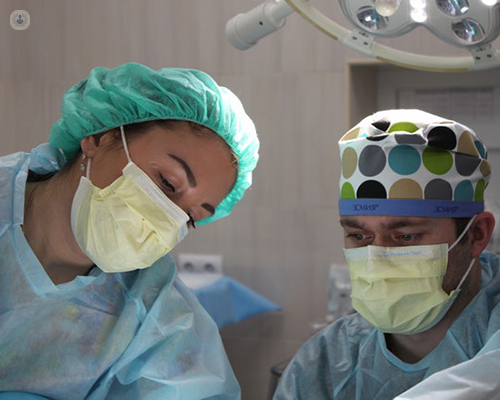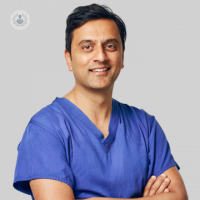An expert guide to POEM treatment for achalasia
Written in association with:Peroral endoscopic myotomy (POEM) is a surgical procedure used to treat achalasia; a rare condition where food cannot pass easily from the oesophagus into the stomach. In this informative article, leading consultant colorectal and general surgeon Mr Amyn Haji gives expert insight on how this minimally invasive procedure is performed.

When is POEM surgery necessary?
POEM is a minimally invasive treatment for achalasia. Achalasia is a condition where the ring of muscle (sphincter) at the bottom of the oesophagus (food pipe) is overactive. Over time, the ring becomes bulkier and doesn’t open normally so food cannot pass easily. People with the condition often report feeling like food is sticking in their chest and the condition can often be painful.
The oesophagus has two layers of muscle which help to push food along; those running in rings and those running along its length, known as the circular and longitudinal muscles. These muscles, along with the sphincter muscle, are also affected in patients with achalasia.
How is POEM performed?
In the POEM procedure the malfunctioning muscles along the oesophagus as well as the sphincter muscle are cut. It is performed by endoscopy in a procedure similar to having a gastroscopy.
POEM is always performed with a general anaesthetic. Once you are under anaesthetic, the doctor will push the endoscope into your oesophagus through your mouth and locate a suitable position at which to start. A cut of around one centimetre in length is made into the inner layer of the oesophagus wall by a specially designed electrosurgical knife. This is sealed up with temporary clips after the procedure, so there are no holes or breaks in the lining. A tunnel is made under the inner lining of the oesophagus so that the muscles can be cut lengthways, right down to the sphincter and a little way beyond, into the stomach. This cut means that symptoms like chest pain can also improve after the procedure.
As the procedure is done entirely through endoscopy, there are no skin wounds or stitches, reducing infection risks and speeding up recovery time compared to open surgical procedures. On average, POEM takes between sixty and ninety minutes to perform, but depending on how thick and bulky the muscles are, it can take a bit longer.
Is POEM a risky procedure?
It is important to note that POEM is a very safe procedure and complications are rare. However, as with any surgical procedure, there is a risk of bleeding and infection but steps are taken to minimise this risk.
In between one and two per cent of cases, perforation of the oesophagus wall, where a small hole is inadvertently made, can occur. This is a serious complication but can be treated immediately during the same procedure. In this case, it may be necessary to stay in hospital for longer than planned under observation to ensure that all is well.
When performed correctly, there have been no reports of POEM failing. Some symptoms of achalasia respond better to the procedure than others. Success can also depend on what type of treatment the patient has previously undergone but the majority of patients will be better off after the procedure. You will be given a realistic appraisal of what to expect by the specialist performing the procedure.
Are there any alternative treatments for achalasia?
POEM is an alternative to more traditional surgery for achalasia. The procedure is keyhole (laparoscopic) but it may not be the best option for every patient with achalasia. The condition can also be treated with balloon stretching from the inside (via endoscopy). This can be effective but is not permanent.
If you are seeking treatment for achalasia, you can learn more about Mr Haji and book a consultation with him by visiting his Top Doctors profile.


